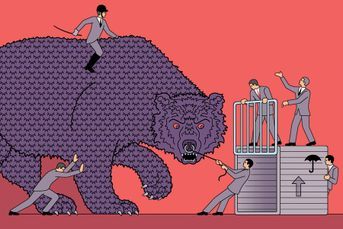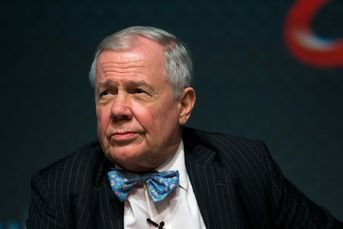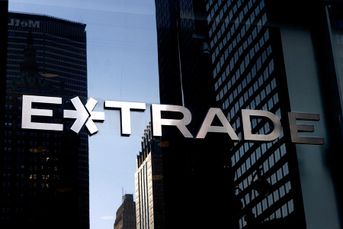Trump tariffs might not mean much for portfolios now
But investments could be affected if the president's move sets off a trade war
The stock market had a tariff tantrum last week in the wake of President Donald J. Trump’s announcement of new tariffs on imported steel and aluminum. The tantrum resumed Wednesday after the resignation of Gary Cohn, the president’s chief economic adviser.
Was the tantrum justified? What effect will new tariffs have on your clients’ portfolios? If the changes amount to just the two tariffs announced last week, very little. But if this is the opening salvo in a trade war, the effects on stocks and the economy could be far-reaching.
Last Thursday, the president announced a 25% tariff on imported steel and a 10% tariff on imported aluminum. “People have no idea how badly our country has been treated by other countries,” Mr. Trump said. “They have destroyed the steel industry, they’ve destroyed the aluminum industry, and other industries, frankly.”
The U.S. trade deficit — the difference between what we import and what we export — was $566 billion in 2017, the highest level since 2008, according to the Commerce Department. The U.S. runs a modest trade surplus with Canada, one of the targets of Mr. Trump’s tariff on imported steel.
In 2017, the U.S. imported 26.9 metric tons of steel, up from 22.5 million tons in 2016, according to the International Trade Administration. That’s about 8% of U.S. steel imported globally, and less than 1% of all U.S. imports. Aluminum is another story: The U.S. imports about 90% of its aluminum.
How does this affect your portfolio? Assuming that tariff talk stops here, not much. Nucor, for example, accounts for just 0.9% of the Vanguard 500 Index fund (VFINX). Alcoa Aluminum isn’t an S&P 500 member, but accounts for only 0.3% of the Vanguard Total Stock Market fund (VTSMX).
Your clients probably do have a lot of stocks in their portfolios that use steel and aluminum, said Tom Essaye, editor of The Sevens Report, a daily market update that goes out to 2,500 advisers worldwide. “Caterpillar doesn’t make tractors out of wood,” he said.
In the wake of Mr. Trump’s announcement, steel and aluminum ETFs jumped while the rest of the market slumped.
“On March 1, when the first shoe dropped, the 16 publicly traded U.S. steel companies saw their market caps increase by $1 billion, while the rest of the S&P 500 lost $400 billion,” said Chris Dillon, an investment specialist for capital markets at T. Rowe Price.
Since then, the market has largely shrugged off the news. “If this is a one-off on steel and aluminum, it’s not a big deal,” said Jim Paulsen, chief investment strategist for the Leuthold Group. “But it’s hard to believe that this is where it stops.”
When trade wars occur, other countries tend to retaliate. In 2010, for example, China imposed a 100% tariff on U.S. chicken feet in retaliation for U.S. tariffs on Chinese tires. The chicken feet trade to China was a $250 million business that U.S. consumption wasn’t going to replace. The U.S. National Chicken Council was not pleased.
“If you’re the prime minister of Canada or the chancellor of Germany, you can’t just let this go, even if it’s small: It’s the principle of the thing,” Mr. Paulsen said. “You can’t just smile and look the other way.”
Should the trade war widen, matters could become more serious quickly. “The European Union is threatening tariffs on everything from Harley Davidsons to agricultural goods,” Mr. Essaye said. “There’s a Pandora’s box on the table. It’s not open, but it’s out of the cabinet.”
During a trade war, the less a company has to do with international trade, the better. But that’s difficult in today’s world, since about half of the earnings of the companies in the Standard & Poor’s 500 index comes from overseas.
“A tariff stock playbook would have to be domestically foused,” Mr. Essaye said. “That would mean regional banks, very specialized retailers and small-cap stocks, which have been outperforming since the tariffs were announced.”
It might also be a time to look more closely at actively managed funds, said Dan Wiener, editor of The Independent Adviser for Vanguard Investors, a newsletter.
“One of the beauties of using actively managed funds is that you have experienced professional portfolio managers with large research staffs making their own decisions about what the impact of trade wars will be on their portfolios,” Mr. Wiener said. “Presumably they will try to sidestep it.” True, many passive managers don’t beat the indexes. His advice: “Don’t buy the average active manager, buy the best ones.”
Bond investors would need to take a defensive position as well, said Charlie Ripley, senior investment strategist for Allianz Investment Management.
“If trade becomes less competitive, you have the potential for higher prices, which would have some effect on bond prices,” he said. Those would not be good effects: Higher prices mean inflation, which the bond market views in the same way a vampire views garlic. Investors would be smart to shorten portfolio durations and look to adjustable-rate investments.
The market’s fear of a trade war doesn’t mean that the trade deficit is a good thing. On one hand, the fact that other countries have a surplus means that they have the capital to lend the U.S. money. “But that’s only if they want to,” Mr. Paulsen said. And there’s no question that some countries take advantage. “Fair trade makes a lot of sense,” he said. “Now that emerging countries are up and running, they need to play by fair rules.”
At least for the moment, the market initially viewed the surprise tariff announcement as a typical Trumpian negotiating tactic: Lots of bluster at first, followed by relatively little action. Mr. Cohn’s departure from the White house undermined that view.
Furthermore, no one really knows what the tariffs will look like. “Will they be on finished goods? Raw steel? Will they include Canada or Mexico?” Mr. Essaye said. “It was so off-the-cuff, which means it could be a negotiating tactic. People just aren’t used to the president throwing that out.”
At the very least, the possibility of a trade war injects a note of uncertainty for stocks and the economy that wasn’t there before.
“The fundamental backdrop of the economy hasn’t changed,” Allianz’s Mr. Ripley said. “It’s just hard to say what will happen with so little information.”
Learn more about reprints and licensing for this article.








